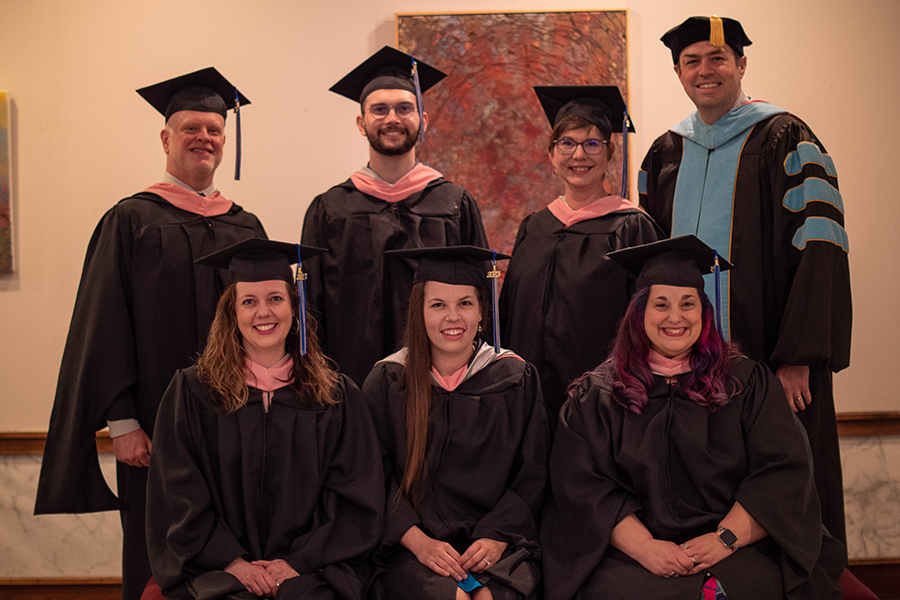Three years since the launch of the Master of Music Education (MME) program at Elizabethtown College, six students from the inaugural cohort have completed the requirements for graduation and were recognized at the College’s 120th Commencement Ceremony on Saturday, May 13.
“It feels pretty special that we were the first cohort,” Sara Alipanah ’23, who is currently a Performing Arts Teacher at Beauvoir, the National Cathedral Elementary School in Washington, D.C. said. “This was a fantastic group of people and we were excited to help shape what this Masters program is and will become.”
Elizabethtown College’s innovative MME program is the only one of its kind in the country to combine a focus on social-emotional learning, world music drumming, trauma-informed practice, and peacebuilding. It is a low-residency program with over 90% of coursework delivered online with one in-person week each summer. As a result, program students and alumni reside in states all across the country including Wisconsin, North Carolina, Tennessee, Virginia/D.C., Pennsylvania, Oklahoma, and New Mexico.
“This was a unique program unlike any other Master of Music Education program currently available,” Alipanah explained. “It incorporated ideas and subjects that I was passionate about bringing into my classroom, including peacebuilding, ethnomusicology, and social emotional learning. The classes that were being offered were also unique and different from what I learned in my undergraduate music education degree.”
With a tagline of “Reclaiming Space for Connection and Care,” the program was designed to speak to a teacher’s desire to recenter what matters most to teachers and students within their classrooms.
“Amidst the demands of standardized testing, many teachers often feel as if they want to reclaim classrooms as places of connection and care,” Kevin Shorner-Johnson, Elizabethtown College Dean of the School of Arts & Humanities and Associate Professor of Music Education said. “We also drew on research that demonstrated that families and caregivers were becoming increasingly disconnected from children because of the distraction of electronic devices.”
In the aftermath of the COVID-19 pandemic where students are returning to the classroom, the need to support social and emotional needs within schools has rapidly increased.
“The elementary music classroom is a place of collaboration, so learning how to implement peacebuilding tools has been integral in helping my students treat each other with kindness, dignity and respect,” Alipanah said. “Students need ways to self-regulate and understand themselves as well as those around them. They also had so much time where they couldn’t interact with each other that now they are re-learning how to function with others in a classroom setting.”
The program culminates with a capstone project that challenges candidates to implement practices of social-emotional learning, trauma-informed learning, peacebuilding, and/or diverse cultures into teaching practice. Capstone projects from the cohort include:
- Mattering in the Music Room by Sara Alipanah ’23
- Music is a Rite: Ritual Action and Identity Formation in the Music Classroom by Ian Davis ‘23
- The Music and Peacebuilding of Fred Rogers by Jared Johnson ’23
- Trauma-informed Toolkit for Music Educators by Michelle Kisner ’23
- Barriers to Music Education for Early Childhood Intervention Programs by Jamie Marrs ’23
- Utilizing Circle Processes for Whole Class Composition in a General Music Class: An Autoethnographic Study of One Teacher’s Experience by Emily Reep ’23

